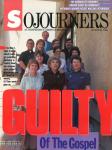In 1985 and 1986, the U.S. government spent an estimated $2 million to prosecute 11 church workers for offering sanctuary to refugees from the U.S.'s "dirty wars" in Central America. After a trial in which defense attorneys were not allowed to introduce evidence of the refugees' or defendants' motives or information on the 1980 Refugee Act, eight defendants were convicted. —The Editors
What is a registered Republican who voted for Ronald Reagan in 1980 doing in the sanctuary movement? Living out her faith and doing what has to be done, says Kay Kelly, the 62-year-old widow and grandmother who was put under house arrest for her refusal to testify as a government witness in the sanctuary trial.
"I was not a political activist looking for a cause," Kelly says, explaining how she got involved in refugee work. "But when you see these people coming in and you hear their stories...to me it's just the thing to do. All through life I've been taught that you love your neighbor as yourself, you help them, you do whatever is necessary."
Kelly began attending Southside Presbyterian Church with her husband and mother in 1981, shortly before the congregation voted to make the church a public sanctuary. After both her husband and mother died and she had been forced into early retirement from her job at the University of Arizona library—all during the last eight months of 1983—Kelly told Rev. John Fife that she needed something to do. In January 1984 she began working with refugees.
For Kelly the issues were fairly straightforward, unclouded by legal technicalities, doubt, politics, or fear. She became aware of the U.S. Refugee Act of 1980 and international law governing the treatment of refugees and decided that sanctuary work was legal. "In my mind and heart, they were refugees, not 'illegal aliens'....I felt we were doing the right thing because our government had signed these agreements...Along with God's help, I felt I couldn't be afraid."
Like most sanctuary workers who transport refugees from the border or open their homes to them, Kelly is not the political or criminal sophisticate portrayed by the government. "I pray every time I go," Kelly says, "that I'm given the courage and strength to know enough, to do and say the right things for the protection of anyone I might have with me...I will survive whatever happens to me, but it's the folks I'm involved with [refugees] that I don't want sent back or misused in our country."
At 8 a.m., January 14, 1985, Kay Kelly found two INS agents and two Border Patrol officers at her back door. They had a search warrant, and they were looking for the 33-year-old Guatemalan refugee woman who had been living at Kelly's house for four months. But Juana had not come home the night before, and all the government found were her belongings; Juana remains safe still today.
Kelly still breaks down in tears when she talks about Juana. "She cried herself to sleep almost every night. Many nights I held her in my arms, and she just cried," Kelly says, crying herself at the memory of it.
WHEN THE GOVERNMENT subpoenaed Kelly to testify in the trial, she didn't need long to think about it: "I didn't think I could be a Judas." Yet she knew her decision not to testify would cost her. "I fully expected that I would go to jail," she says. "I was ready...Every day I went to court, I went prepared, thinking I might not come home that night."
On February 18, Kelly was brought to the witness stand and questioned by government prosecutor Donald M. Reno Jr. "I refuse to answer," she told him. "I assert my privileges under the free exercise clause of the First Amendment." Of that moment in the courtroom, Kelly says, "I was so calm and peaceful...I just knew God was with me...He was telling me I had made the right decision."
Two other witnesses, Tucson minister George Lockwood, 39, and Mary Ann Lundy, a 53-year-old Presbyterian elder from Minneapolis, also refused to testify. For their faithfulness and steadfastness, U.S. District Judge Earl. H. Carroll placed them under house arrest, confining them to their homes for the remainder of the trial. After Kelly was sentenced, she walked away from the bench, while the defendants, defense attorneys, and many spectators stood up in protest of the sentence.
The judge eventually released from house arrest the three church workers, as well as a Salvadoran refugee who had refused to testify for fear it would endanger herself and her family, when the defense rested its case on March 14 without calling any witnesses.
"I think it's hard for any of us to understand that our government would do this to us," Kelly says of her experience. "I don't feel we're criminals...We're paying our dues to God and society."
Kelly, now a deacon at Southside, expects to keep paying those dues—and reaping the rich rewards—for a long time to come.

Got something to say about what you're reading? We value your feedback!